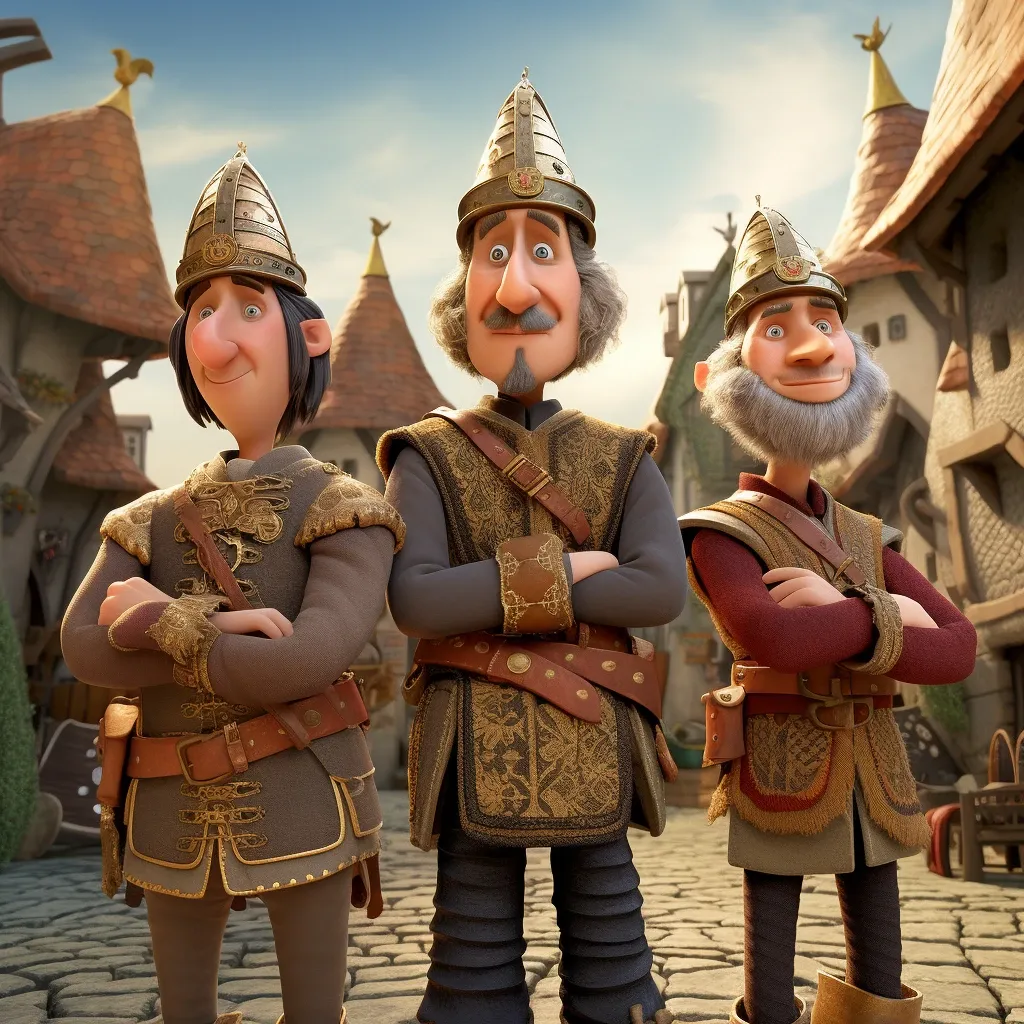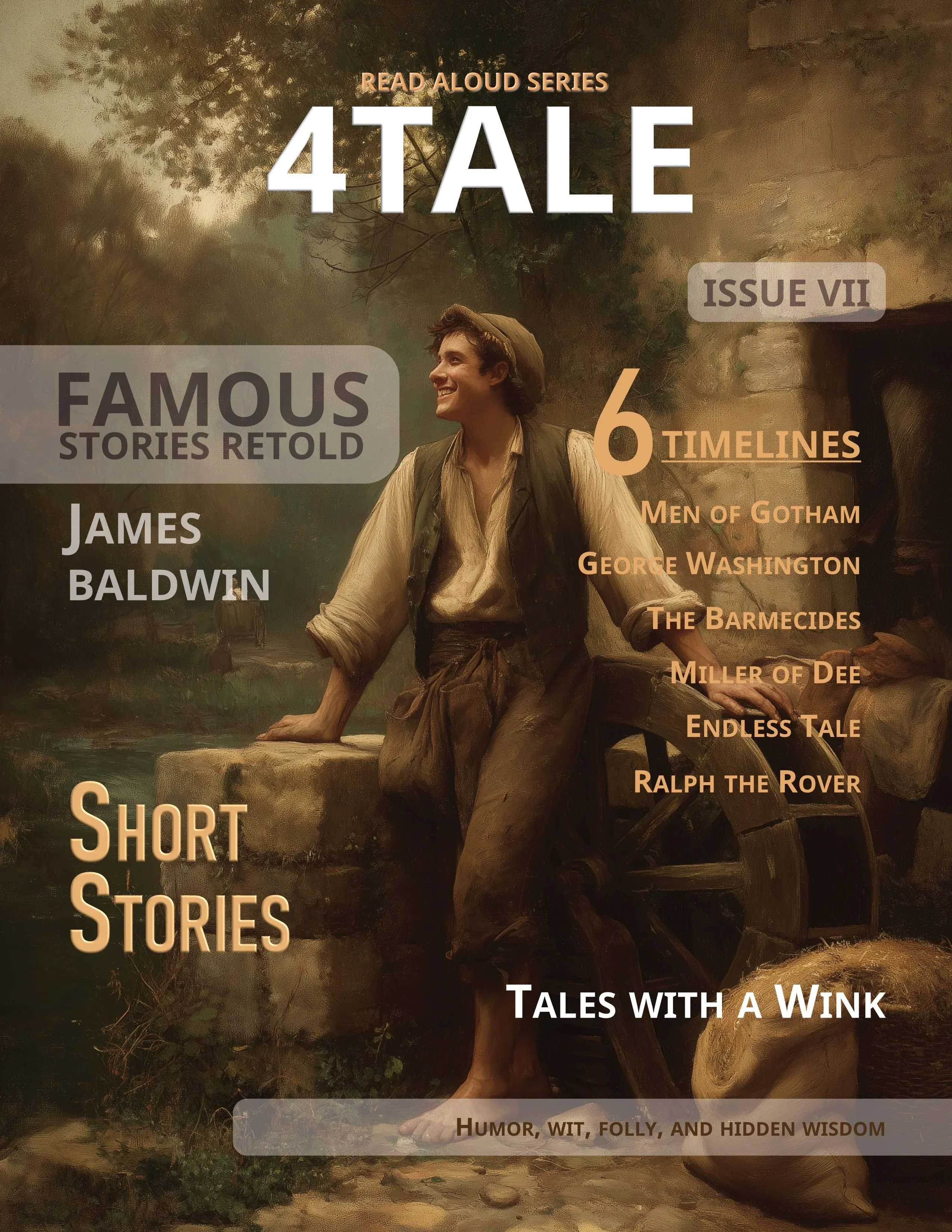BY JAMES BALDWIN
Three Men of Gotham
Famous Stories Retold: Story 10 of 50

Heading

Village of Gotham: Gotham was a village known for its wise but seemingly foolish inhabitants.
Royal Avoidance: The villagers pretended to be fools to avoid a royal visit, knowing it would be costly.
A good book we like, we explorers. That is our best amusement, and our best time killer
- Roald Amundsen, Explorer
The Wise Tales of Gotham's Trio in England's Folklore
In the quaint town of Gotham, England, a folklore persists, centered around the antics of three men. Their seemingly trivial encounter on a bridge carries a profound wisdom, masked by their eccentricities. Delve into a world where the ordinary becomes extraordinary, where sheep, sacks of meal, and bridges become tools for teaching life's greatest lessons. As we unravel the wisdom of Gotham's trio, you'll be amazed at what you discover, and perhaps, just perhaps, you'll find that the jesters aren't as foolish as they first appear.
The Eccentric Town of Gotham: A Brief Overview
Located in the heart of England is the town of Gotham, a locale etched in our memories not only for its peculiar name but also for the remarkable tales circulating about its inhabitants. The inhabitants of this quaint town have been, for generations, the subjects of various anecdotes highlighting their unique, often humorous, approach to life. The story of the three men of Gotham, including the two - Hodge and Peter, who met on a bridge, and the third man who arrived with a sack of meal, stands as a prime example of the peculiarities of this town and its people.
Introduction to the Characters: Hodge and Peter
The narrative of the three men of Gotham begins with the encounter of two characters on a bridge - Hodge and Peter. Hodge, returning from the market, meets Peter who is on his way to the same. Their conversation reveals Peter's intention to buy sheep and return over the bridge, leading to a seemingly nonsensical disagreement. With no sheep in sight, they argue and behave as though a flock is present, their actions serving as an indication of the peculiar behavior often associated with the residents of Gotham.
Podcast
The Dispute on the Bridge: Unraveling the Argument
The argument between Hodge and Peter, although seemingly ridiculous, is emblematic of the eccentricities prevalent in the town of Gotham. Their dispute, revolving around the hypothetical situation of transporting non-existing sheep over the bridge, escalates to the extent that they threaten each other. This argument, devoid of any real context, only heightens the absurdity of the situation. The quarrel, however, shifts from being an ordinary disagreement to a symbol of the town's peculiarities, setting the stage for the arrival of the third man and the enriching lesson he brings with him.
The Unexpected Arrival: The Third Gotham Man
As the quarrel between Hodge and Peter reached a fever pitch, an unexpected character entered the scene: another man of Gotham, freshly returned from the market. Unlike our previous characters, this man carried not an argument, but a sack of meal on his horse. His timing was impeccable, arriving just as his neighbors were embroiled in a seemingly pointless dispute, one that involved sheep that were notably absent. The third man, observing the quarrel, saw not a legitimate disagreement, but foolishness. And thus, he decided to intervene.

A Lesson in Wisdom: The Sack of Meal Incident
The third man sought to teach Hodge and Peter a lesson in wisdom. With a dramatic flourish, he asked Peter to help him lift his sack of meal onto his shoulder. Positioning himself at the side of the bridge, he proceeded to perform a surprising act. He opened the sack and poured out all the meal into the river below. With the meal gone, he turned to his neighbors and posed a simple question: "Can you tell how much meal is in my sack?"
The Final Revelation: Drawing Parallels and Conclusions
The answer was obvious, and both Hodge and Peter correctly responded that the sack now contained no meal. The third man confirmed their answer, then used their correct response to draw a parallel. He likened their quarrel about non-existent sheep to his now-empty sack of meal. His blunt observation exposed the emptiness of their argument, revealing that their dispute held no more substance than his sack held meal. This final revelation served as a stark reminder of the importance of wisdom in daily interactions, and the folly of quarreling over trivialities.
Conclusion
In the concluding act of this quaint parable, the third man of Gotham, with his simple yet profound act, leaves Hodge and Peter, and indeed us, contemplating our own follies. He challenges us to discern the difference between stubbornness and wisdom, and to recognize when arguments are as empty as his sack of meal. The men of Gotham might appear as jesters, yet their story serves as a mirror, reflecting our own irrational tendencies. So, dear readers, let us strive to embody the wisdom of the Gotham trio and steer clear of senseless quarrels.





